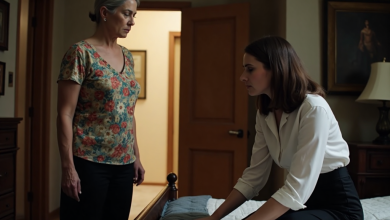I got a call from the school nurse about my son. I hurried over. He was trembling, with a mark near his eye. “Dad, I went home for lunch

The nurse’s voice on the phone was too steady. That’s what told me something was wrong. In a crisis, people’s voices crack, they rush their words. But this was a practiced, professional calm that was more chilling than any panic. “Mr. Jensen,” she said, “your son, Leo, is here in the school office. He needs you now.”
I drove like a man chasing a ghost, the suburban streets blurring into a meaningless watercolor. When I reached the school, I found him huddled in a chair, his small eight-year-old frame shaking, one eye already beginning to swell into a grotesque shade of purple. I knelt in front of him, my voice level, a trick I’d learned in places far more dangerous than this. “What happened, Leo?” His lips trembled.
The words spilled out in jagged, broken pieces. “Dad… I went home for lunch. Mom was with… with Uncle Steve. I tried to leave. He… he slammed my face into the door. Locked me in my room. I jumped from the window. They’re still there.” The air in the small, quiet office thickened. My pulse, contrary to what you might expect, slowed. Military training doesn’t make you fearless; it makes you deliberate.
My wife. My brother. Together. The betrayal should have shattered me. Instead, it sharpened every sense, focusing my entire being into a single, cold point of purpose. He had touched my son. That was his first mistake. His second was assuming I was still the mild-mannered software salesman I pretended to be. I carried Leo to the car, every muscle in my body coiled tight as a spring.
She’d told me Steve was just “helping out” while I was away on work trips—picking up groceries, fixing a leaky faucet. I had let myself believe it because believing is easier than confronting a truth that might tear your world apart. But the bruise blooming under my son’s eye was not a product of my imagination.
The tremor in his voice was not an invention. Suddenly, all the pieces I had unconsciously collected clicked into place with horrifying clarity: the hushed laughter I’d overheard when I came home early one evening; the way she angled her locked phone away from me; the faint scent of a cologne that wasn’t mine lingering in our bedroom. This wasn’t just infidelity. It was an invasion.
My own blood, in my bed, touching what was not his. And now, harming my son. The betrayal was no longer an abstract suspicion; it had two faces, and both were now staring back at me from the wreckage of my life.
Outwardly, I was just a father tending to his injured child. I took Leo to the urgent care clinic, my movements calm and reassuring. I bought him ice cream, held his hand while the doctor examined him, and listened as he recounted the story again, this time to a kind-faced police officer.
But inwardly, I was a soldier on a new mission. I was cataloging every detail, planning every move, preparing for a war to be fought not on a foreign battlefield, but in the heart of my own home. The investigation began that night. While Leo slept, a teddy bear clutched in his arms, I moved through our silent house like a ghost. I started with her phone records, easily accessed through our family plan’s online portal.
The calls to Steve were numerous, late at night, their durations stretching for hours. They were labeled “Work,” but I knew my brother hadn’t worked a real job in years. Then, the financial trail. Credit card statements revealed a hidden narrative of their affair. Hotel rooms booked on days I was out of town, two breakfasts charged to the room. Receipts from gas stations in towns far outside her usual commute.
Every transaction was a breadcrumb leading to the same ugly truth. Their affair wasn’t a fleeting mistake; it was a shadow life, meticulously constructed behind my back. I moved through my own house like an intruder, checking drawers, opening her laptop when she left it unattended.
In a hidden folder, I found the photos she thought she’d deleted. Pictures of them together, laughing, intimate, in places that were sacred to me. My son’s toys were visible in the background of one shot, our kitchen table in another. They hadn’t just betrayed me; they had desecrated the one place in the world that was supposed to be our sanctuary.
I said nothing. Not yet. Because silence is a weapon. Silence gives you the upper hand. Silence makes your enemy believe you are blind, that you are weak. And all the while, I was setting my trap. The final, damning proof came from the cameras—small, discrete devices I had installed in the common areas of our home after the incident at the school.
I told my wife they were for security, a believable precaution in our quiet, suburban neighborhood. She hadn’t objected. Why would she? She had nothing to hide. I watched the footage alone in my office, the glow of the monitor illuminating my face in the darkness.
There was Steve, walking through my front door with the casual entitlement of a man who believed he owned the place. There was my wife, greeting him with a kiss that had once belonged to me. Their careless whispers, their shared laughter, and then, the sound that froze the blood in my veins: my son’s voice, small and scared, asking if he could go back to school early.
I watched in cold, silent fury as my brother, my own blood, shoved my son. I saw the door slam, heard the muffled cry. It was all there, in high-definition clarity. I burned the images into my mind, every frame a new layer of resolve. Then, I copied the footage onto a single, unmarked flash drive.
That evening, I placed the flash drive on the center of the dinner table. My wife was humming, moving between the stove and the table, the picture of domestic bliss. She noticed it as she was setting down a plate and froze, her eyes darting from the small, black rectangle to my face.
“What’s this?” she asked, her voice a little too bright. “Press play,” I said. She picked it up, her hands trembling slightly, and plugged it into her laptop. Her expression collapsed as the footage began to play. First, denial, her head shaking in small, jerky movements. Then, panic, her eyes widening in horror. And finally, the desperate, dawning realization that there was no escape, no lie that could explain away the images flickering on the screen.
“Please,” she started, her voice a strangled whisper. I held up a hand, my movements calm, controlled, deadly quiet. “You let him touch my son.” Tears spilled down her cheeks. Excuses, justifications, blame—it all came tumbling out in a torrent of desperate words. She tried to close the laptop, but the footage kept playing, every second a fresh cut. “I made a mistake,” she sobbed.
“No,” I said, my voice as cold and hard as stone. “You made a series of choices. And this is the consequence.” She begged, she promised, she swore it was over. I remained still, a soldier on watch, my face an unreadable mask. Then, I leaned forward.
“Here’s what is going to happen,” I said, my voice low and even. “You will pack a bag, and you will leave this house tonight. You will sign whatever custody papers my lawyer draws up. You will never see Leo again without my express, supervised consent.
And when the courts see this footage, they will understand why.” Her breath hitched, the full weight of her situation finally sinking in. The affair wasn’t her undoing. The violence against our son was. That was the rope she had tied, and it was now tightening around her own neck. I slid the flash drive from the laptop and back into my pocket, my decision as final and irrevocable as a death sentence. She reached for me, a last, desperate plea, but I was already standing.
“Steve can have you,” I said, my voice devoid of all emotion. “But he can’t save you from this.” She left that night, a broken, silent ghost, leaving behind the wreckage of our marriage. I found Leo asleep in his bed, his bruised face peaceful in the soft glow of his nightlight. I sat with him for a long time, his small hand curled around my finger, and I knew, with a certainty that settled deep in my bones, that he would heal.
He was stronger than both of them combined. As for me, I felt no pity, no rage. Only a cold, sharp clarity. They thought their betrayal had made me weak. They had forgotten what I was trained to do. Assess a threat. Endure the damage. Execute the mission. I didn’t need blood. I didn’t need violence. I needed the truth.
And the truth, in the end, destroyed them more completely than any weapon I could have ever wielded. He touched my son. Once. And that was enough to end them both.




